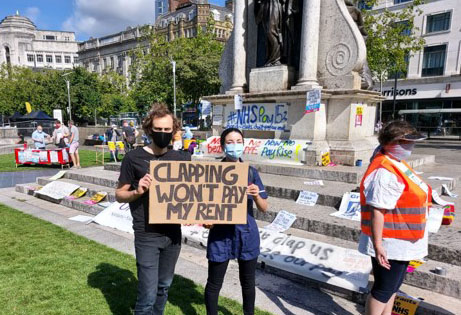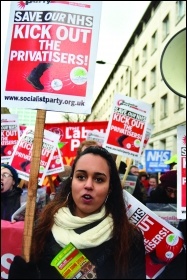Editorial of the Socialist issue 1140
NHS after 3 July protests
Trade unions must organise serious action
The NHS protests around the country on 3 July should be the start of building a mass campaign for decent pay and to save the NHS. Well over a million people work in the NHS. Organised in trade unions, backed up by community campaigns, these workers have tremendous potential power.
NHS workers have campaigned for a 15% pay rise. The Tories proposed an insulting 1% to workers who have spent the last 16 months working themselves to exhaustion to save lives.
Following an NHS Pay Review Body recommendation, the Tories are due to announce what they will offer any day – potentially right at the end of the parliamentary term.
Any announcement which does not give NHS workers what they deserve should be met with immediate protests from the NHS trade unions, and they should make clear their intention to prepare for national coordinated strike action.
The rest of the public sector faces a pay freeze. With a bold lead from the tops of their respective unions, care workers, teachers, civil servants, council workers and so on would respond to a call for joined-up action.
And it’s not only the question of pay. Despite batting away calls for a Covid inquiry, with the claim that it would be a distraction from fighting the pandemic, the Tories have nonetheless found time to produce a white paper on the future of the NHS in England.
A new health and care bill could be published at any time (see opposite page). Even if it is delayed by the resignation of former Health Secretary Matt Hancock, the Tories’ aims remain clear.
If it is based on the white paper, the bill will be a blueprint for further privatisation, a reduction in democratic checks, and the further break-up of a national service. It must be opposed.
There should be protests at Parliament when the bill is debated and a national NHS demonstration, all of which would help prepare the ground for the necessary strike action.
Fightback potential
The potential to build a fightback is clear. Workers in a whole number of workplaces and sectors, from construction and buses to housing and schools, have recently been on strike, some achieving important victories. Members of the Royal College of Nursing and GMB union voted to reject the 4% pay rise offered by the Scottish government.
Importantly, members of Unison, the biggest public sector union and the biggest union in the NHS, voted for change in the national executive elections.
The left, including four Socialist Party members, now has a majority on the National Executive Council (NEC), surrounding recently elected right-wing general secretary Christine McAnea.
Disgracefully, Unison’s Health Service Group Executive, still dominated by the right wing, refused to back the 3 July NHS protests.
Socialist Party members will appeal to others on the NEC to ensure a fighting stance and plan of action is laid out urgently, to make it clear to members in the NHS and the wider public sector that the new union executive will live up to the expectations placed on it by members desperate for a fight.
Hancock’s resignation is just the latest in a series of events that expose the weakness and divisions in the Tories.
A serious campaign on the NHS can be instrumental in the fight to kick them all out. It means part of the struggle has to be to fight for an alternative: a new mass working-class party that can articulate workers’ anger; campaign for a programme of a 15% pay rise, full funding and to end the privatisation of the NHS; and fight for a socialist government that can implement such a programme.
- Fight the health and care bill
- 15% pay rise now for all NHS and social care staff
- Reverse all privatisation within the NHS. Abolish the Private Finance Initiative and cancel all debts
- Bring all outsourced workers and services in-house on a permanent contract
- Nationalise the private healthcare sector, care homes, the medical supply industry and the pharmaceutical companies – integrate them into the NHS
- A fully publicly funded and democratically controlled NHS and care system free at the point of use










